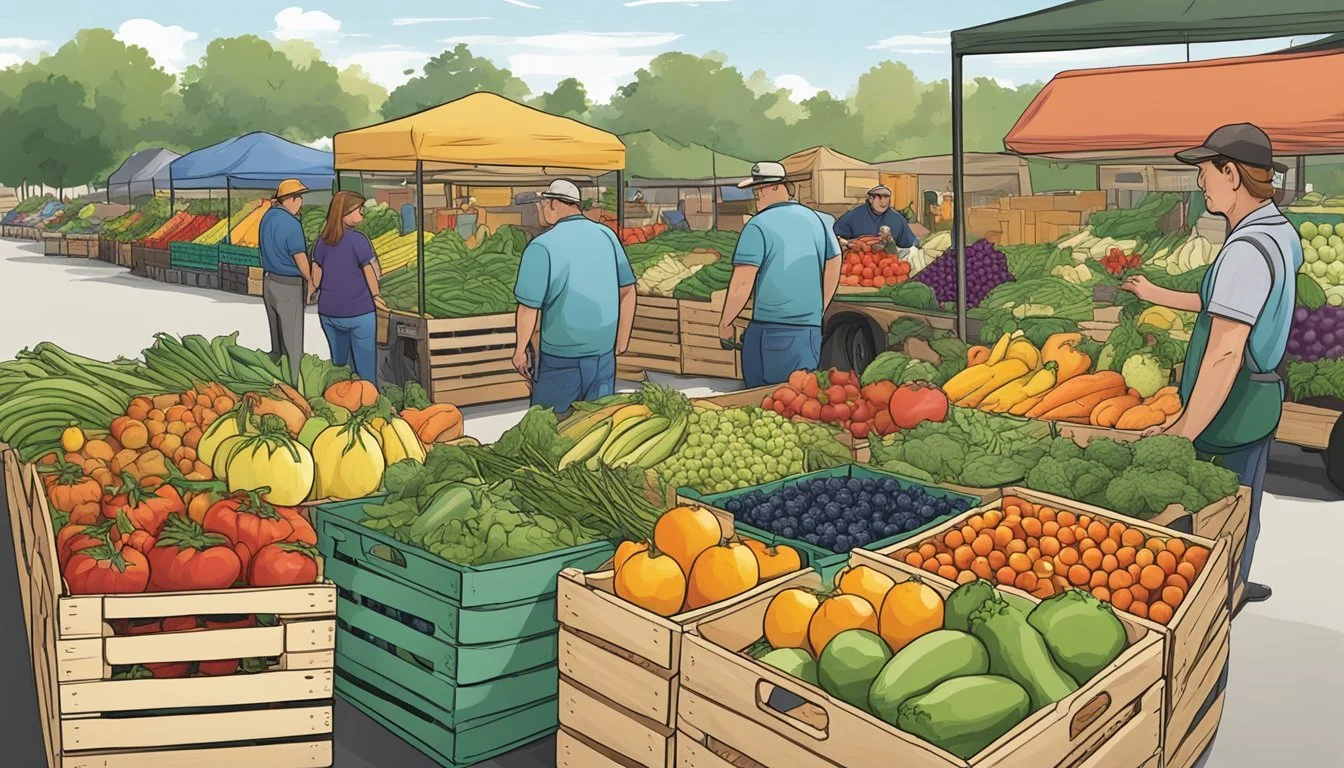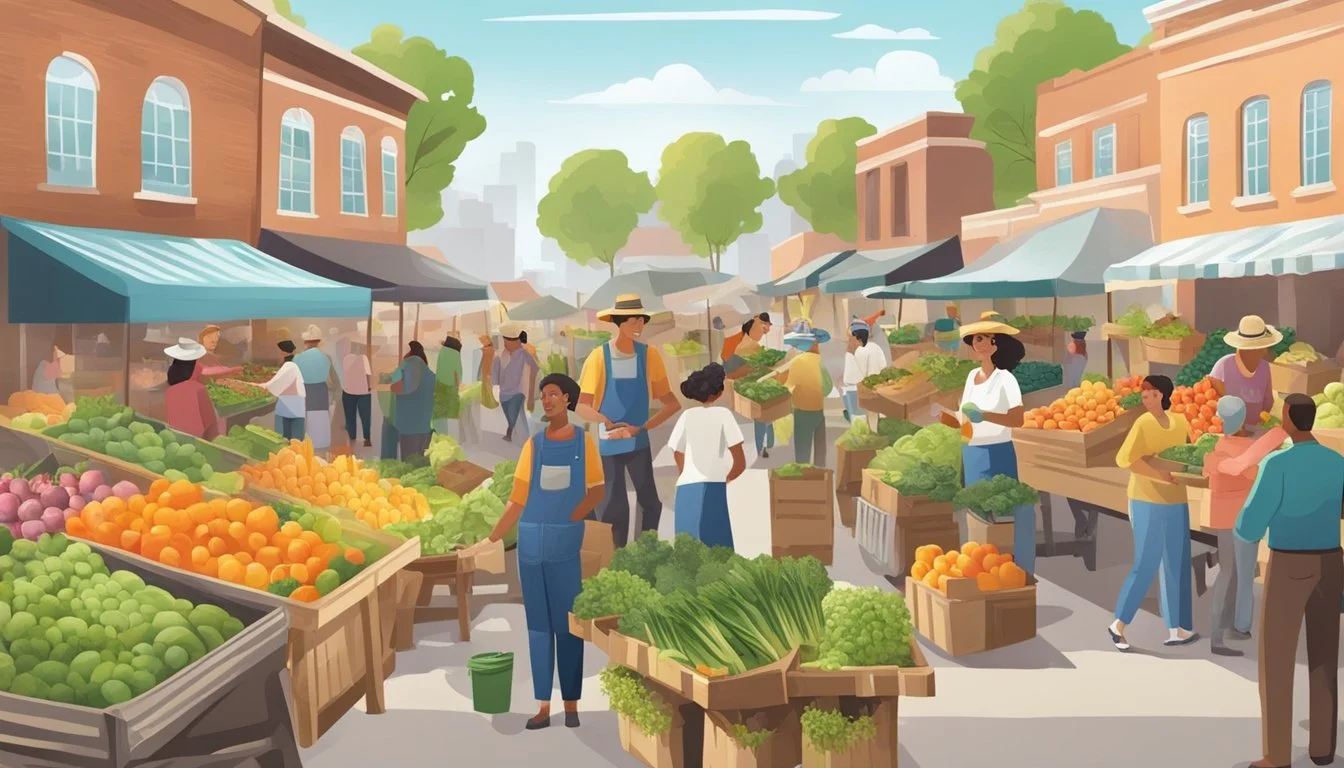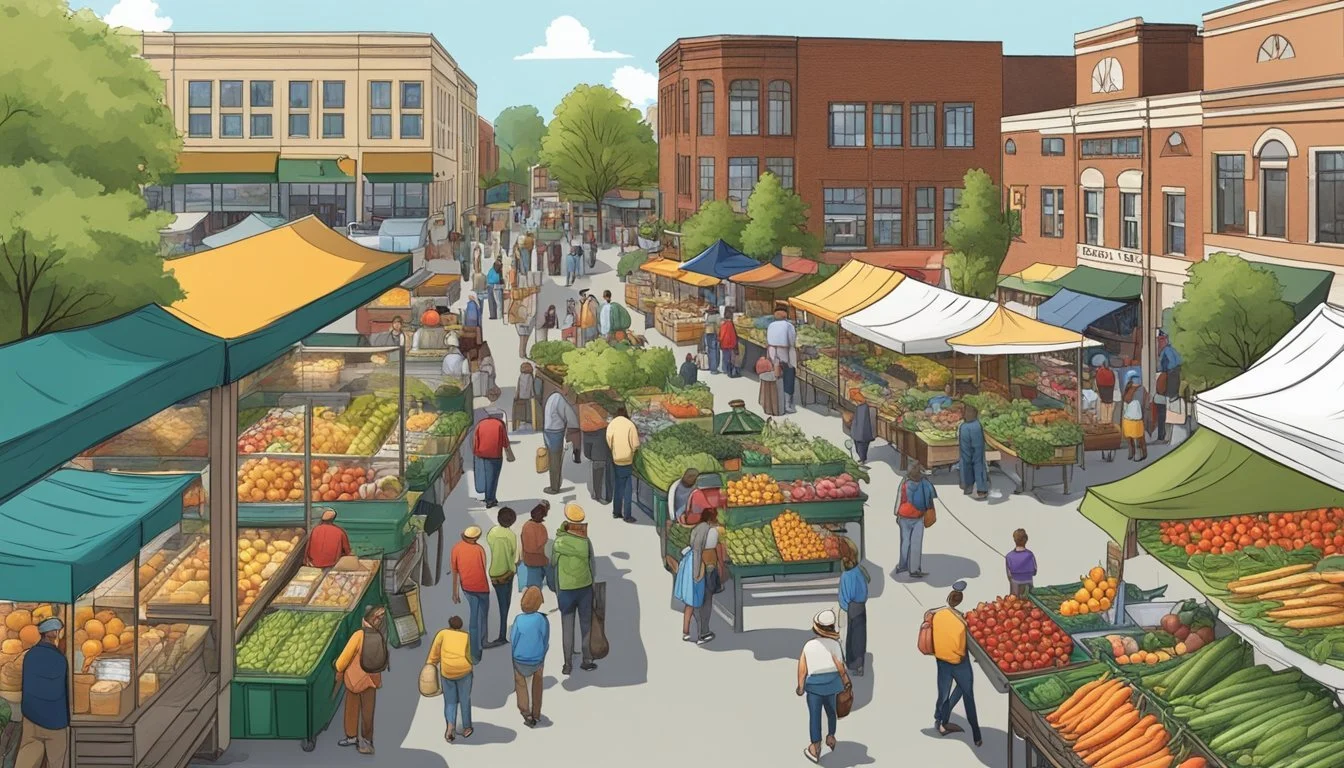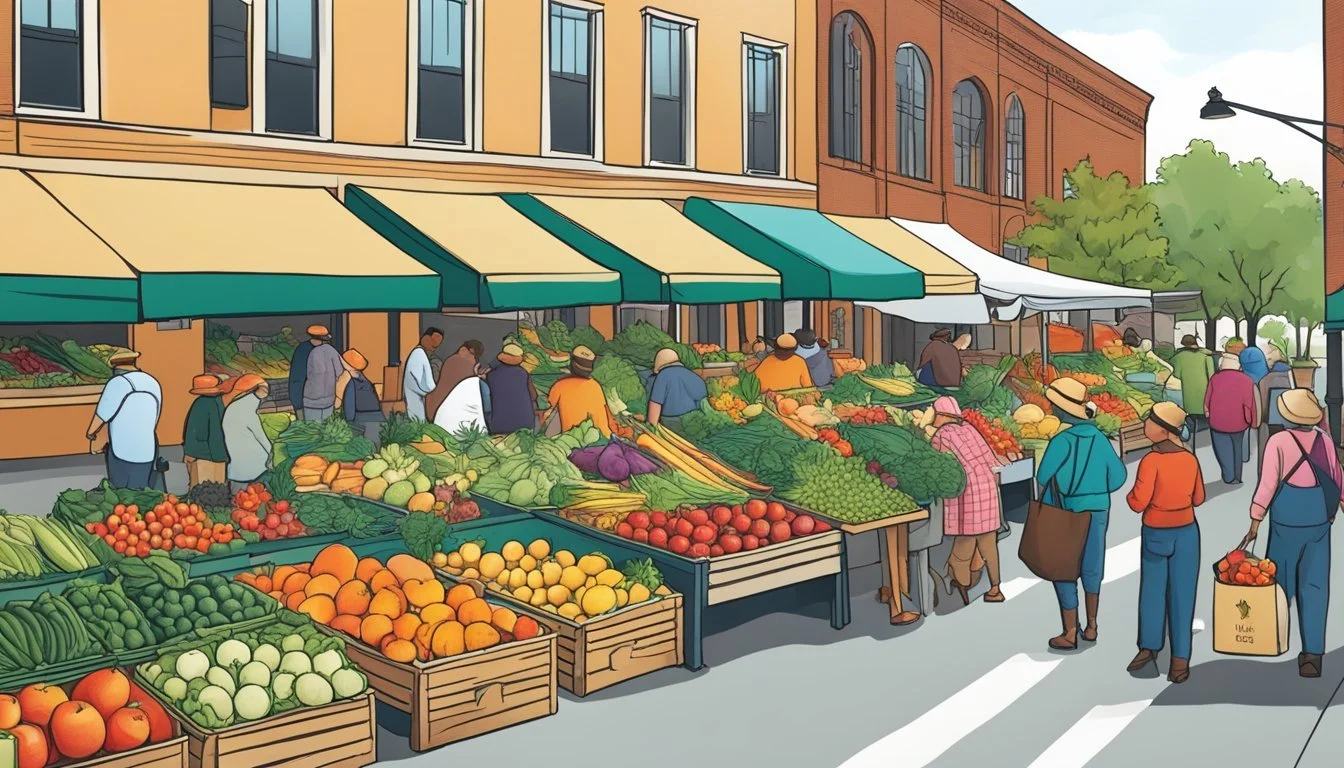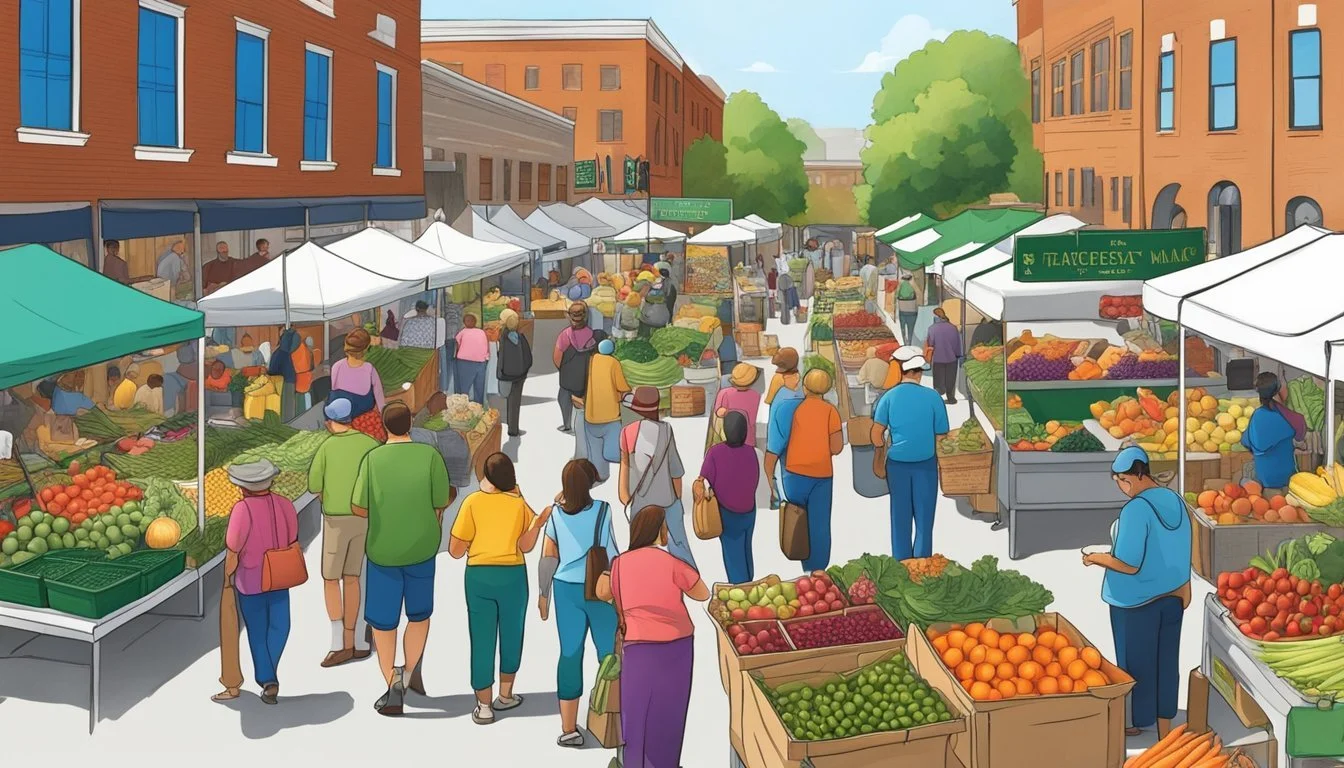Community Supported Agriculture (CSA) in Dearborn, MI
Advantages and Local Impact
Community Supported Agriculture (CSA) has been growing in popularity as a means for consumers to purchase local, seasonal food directly from farmers. In Dearborn, Michigan, this model has been embraced as a way to connect residents with fresh produce while supporting local agriculture. Through CSA programs, farmers in and around the Dearborn area offer shares to customers, providing them with regular distributions of farm products, mainly consisting of a variety of vegetables and sometimes including other items like fruits, honey, eggs, and dairy.
The CSA model benefits both farmers and consumers. Farmers in the Dearborn area are able to plan their growing season with a better understanding of market demand, receiving upfront payment that assists with the farm’s cash flow. Consumers enjoy the advantages of having access to high-quality, fresh food sourced close to home, along with the opportunity to learn more about how and where their food is produced. CSA members often share a commitment to sustainable farming practices and a local food economy, fostering a sense of community around food production.
In the Dearborn region, the landscape of CSA choices varies from urban farms practicing organic methods to longer-established farms utilizing biodynamic practices. Options for CSA programs allow for weekly, monthly, or seasonal participation, with flexibility in pricing and pick-up points to cater to diverse customer needs. This system supports not just the health of residents but also contributes to the economic and environmental well-being of the region by reducing food miles and reinforcing sustainable land management.
Understanding Community Supported Agriculture (CSA)
Community Supported Agriculture represents a vital part of Dearborn, Michigan's local food system, offering a platform for direct farm-to-consumer connections.
Defining Community Supported Agriculture
Community Supported Agriculture, commonly known as CSA, is a model where consumers purchase shares of a farm's harvest in advance. This upfront investment provides farmers in Michigan with working capital and secures a demand for their produce. CSA shareholders, in turn, receive regular distributions of fresh, locally grown produce throughout the farming season.
The CSA Model Explained
The fundamental structure of the CSA model operates on mutual support. Shareholders typically contribute at the beginning of the growing season, which helps mitigate the financial risk for the farmers. The model ensures:
Pre-harvest income: Farms benefit from early season capital.
Shared risks and rewards: Crop abundance or shortfalls are distributed among members.
Community engagement: Consumers gain insight into the source of their food, fostering relationships with growers.
History and Evolution of CSAs in Michigan
Michigan's agricultural backdrop has seen the CSA model evolve as a response to the burgeoning demand for local, sustainable food systems. Early adopters paved the way for a diversity of farms to adopt this model, varying from small-scale family operations to larger, cooperative structures. They are not only integral in bolstering local economies but also in fostering community relationships centered around food sovereignty and sustainability.
Benefits of Joining a CSA
Joining a Community Supported Agriculture program in Dearborn, MI, promises a variety of benefits spanning from access to fresh produce to bolstering the local economy. Members receive directly sourced food while supporting environmental sustainability.
Fresh and Locally Grown Produce
Members rejoice in the bounty of fresh fruits and vegetables, which are harvested at their peak ripeness. Local farming means produce travels minimal distances, ensuring maximum freshness upon delivery.
Environmental Sustainability
CSAs minimize the carbon footprint typically associated with long-distance food transport. Members partake in a system that uses sustainable farming methods, reducing the impact on the environment.
Economic Advantages for Farmers and Members
Farmers gain a reliable income stream through pre-season funding from member subscriptions.
Members often enjoy cost savings over time when participating in CSA programs by obtaining food directly from the source.
Health and Nutritional Upsides
Consuming CSA produce can lead to a healthier diet rich in nutrients. Members benefit from a diverse array of vegetables and fruit, encouraging a balanced and healthful eating pattern.
CSA Operations in Dearborn
In Dearborn, Michigan, the CSA model thrives, providing residents with access to fresh, locally grown produce through various organic farms. These operations emphasize non-GMO and heirloom produce, aligning with community desires for sustainable and health-conscious farming practices.
Seasonal Availability and Crop Selection
Dearborn's CSAs offer a diverse range of vegetables that change with the seasons, ensuring that subscribers receive the freshest produce at its peak of flavor. A typical CSA share might include:
Spring: Spinach, lettuce, and other leafy greens
Summer: Tomatoes, peppers, and cucumbers
Fall: Root vegetables like carrots and beets
Winter: Hearty varieties such as kale and squash
Heirloom varieties are often featured, celebrating the region's agricultural heritage and biodiversity.
Organic and Biodynamic Farming Practices
Local CSAs near Dearborn implement organic farming practices, abstaining from using synthetic pesticides, herbicides, and fertilizers. This nurtures soil health and promotes a balanced ecosystem. CSAs following biodynamic methods view the farm as an interconnected system, often incorporating livestock to produce compost and practicing crop rotation for soil vitality.
Some CSAs in the area offer certified organic vegetables to their members, assuring them of produce grown according to national organic standards. Consumers can take pride in supporting agricultural practices that are environmentally friendly and committed to long-term stewardship of the land.
Membership and Subscription Details
When joining a Community Supported Agriculture (CSA) program in Dearborn, members subscribe to receive a portion of the farm's harvest. They should be aware of the different types of shares offered, payment options, including SNAP benefits for eligible members, and the inherent risks and rewards of subscribing to a CSA.
Types of CSA Shares
CSA farms typically offer a variety of shares to accommodate individual needs and preferences. The most common types include:
Vegetable Share: A mix of seasonal vegetables.
Fruit Share: Seasonal fruits, which may be offered separately or combined with vegetables.
Egg Share: Weekly or biweekly provision of fresh eggs.
Meat Share: Share of locally raised meat, often on a monthly basis.
Each share type has a set distribution frequency, usually weekly or biweekly, through the growing season.
Cost and Payment Options
Subscription costs vary depending on the type of share and the length of the subscription. Payment plans often include:
Upfront Payment: Full payment before the start of the delivery season.
Payment Installments: Several payments spread throughout the season.
SNAP Benefits: Farms may accept SNAP benefits, providing accessible options for low-income households.
Discounts may be available for early sign-ups or referrals. A detailed table of cost per share type is essential for transparency.
Understanding the Risks and Rewards
Subscribing to a CSA share comes with both rewards and risks that members must understand:
Rewards: Fresh, locally grown produce, supporting the local economy, and fostering a close relationship with the food source.
Risks: Crop yields may vary due to weather or other unforeseen factors, affecting the share quantity and variety.
Members share in the bounty as well as the scarcity, which is central to the CSA model's community-support ethos.
Community and Education
In Dearborn, Michigan, Community Supported Agriculture (CSA) offers a unique intersection where community engagement and education flourish through the direct relationships between local farmers and their consumers. These CSA programs not only strengthen local food systems but also serve as fertile grounds for learning and collaboration.
Building Relationships between Farmers and Consumers
Community supported agriculture fosters a symbiotic relationship where people support local agriculture by subscribing to the harvest of a specific farm or group of farms. Through this model, members of Dearborn's community are directly connected with local farmers, often through a weekly pickup of fresh produce. This consistent interaction builds a rapport and a deeper understanding of where their food originates.
Farmers Markets: A place where CSA members can often collect their shares and engage in dialogue with the people who grow their food.
Local Food Systems: CSAs boost the economy by keeping the food dollars circulating within the neighborhood, reinforcing the importance of preserving local agriculture.
By participating in CSAs, consumers not only get access to fresh, local produce but also contribute to the sustainability of the farms they endorse.
Educational Opportunities and Events
Education is a vital component of CSA programs. Events and opportunities designed to educate members on sustainable practices, food preparation, and the benefits of eating locally are frequently offered.
Workshops: Inclusive sessions on organic farming, food preservation, or heirloom vegetable cultivation.
Farm Visits: These allow people to observe farming techniques and further appreciate the effort behind their weekly bounty.
Farmers leverage their unique position to inform members about agricultural practices, enlivening their connection to the food they consume. Moreover, these educational environments encourage individuals to make healthier food choices and to better understand the impacts of their dietary decisions on the environment.
Support and Resources
Community Supported Agriculture in Dearborn, MI benefits from various support systems and resources aimed at strengthening local food systems. Entities like Michigan Farm to Family have contributed significantly to making this possible.
Local Government and Private Grants
Local governments and private organizations offer grants that bolster CSA initiatives. Michigan Farm to Family is an example where families facing food insecurity get the opportunity to participate in CSA programs. This is due to the strategic use of grants aiming to improve access to fresh produce.
Types of Grants Available:
Municipal Grants: Targeting urban agriculture and local food infrastructure.
Agricultural Grants: Supporting sustainable farming practices and heirloom produce cultivation.
Grant Impact:
Increased diversity of crops.
Enhanced sustainability of local farms.
Support from Markets and Local Food Initiatives
Farmers' markets and local food initiatives offer significant support to CSAs by providing platforms for direct sales and community engagement. Initiatives like the CSA Innovation Network connect farmers with consumers and help create a robust backbone for local food systems.
Key Supportive Actions:
Promoting CSA shares within markets.
Facilitating farmer-consumer relationships.
Examples in Dearborn:
Markets featuring CSAs as vendors.
Collaborative events with local food initiatives to showcase CSA benefits.
Support from markets and local initiatives not only facilitates economic growth for CSAs but also fosters a stronger connection between Michigan communities and their food sources.
Local Impact and Success Stories
The integration of Community Supported Agriculture (CSA) within Dearborn, MI, showcases a successful model of local food distribution, strengthening the bond between residents and regional farmers. This section uncovers a few of the success stories and positive feedback from CSA initiatives in the area.
Case Studies: Successful CSAs in Dearborn and Surroundings
Tiny Acres, an urban farm located in the nearby Hamtramck, Michigan, exemplifies CSA success. Specializing in non-GMO and heirloom produce, Tiny Acres operates on organic practices. Their flexible CSA programs range from weekly to seasonal commitments, catering to diverse community needs and ensuring access to fresh, local food.
Another emblematic case is the collaboration between Dearborn's farmers markets and local CSAs, which help to ensure that fresh produce from CSAs is accessible to an even wider public. By creating a symbiotic relationship, the markets serve as pick-up points, and in some cases, allow residents to purchase additional products from CSA farmers on-site.
Testimonials from CSA Members and Farmers
CSA members often share their satisfaction with the quality and variety of produce received. One local Dearborn resident mentioned, "Receiving our weekly share feels like Christmas morning. The freshness and flavor of the vegetables are incomparable to what we used to buy at the grocery store."
Farmers, in turn, express appreciation for the CSA model's reliable income stream and community connection. A CSA farmer from the area highlighted, "CSA allows us to plan better for the season, reduce waste, and forge meaningful relationships with our customers. It’s more than farming; it’s building a community."
These narratives underscore Community Supported Agriculture's potential in forging resilient local food networks and amplifying the success of farmers and consumers alike in Dearborn and its environs.
Challenges and Considerations
In the context of Dearborn, MI, Community Supported Agriculture (CSA) faces unique challenges that require careful consideration to mitigate risks and ensure effective distribution. Key considerations involve the management of unpredictable weather and the logistics surrounding product distribution and collection.
Dealing with Weather and Climate Issues
CSA models in Dearborn must contend with variable weather and climate issues that can pose significant risk to crop yields. Access to water for irrigation during dry spells is critical, while the safeguarding of crops from frost and storms is necessary to maintain consistent supply. They can implement strategies like:
Crop Diversity: Growing a variety of crops to ensure some resistance to unexpected weather changes.
Water Management: Investing in efficient irrigation systems to cope with periods of drought or water scarcity.
Logistics of Distribution and Collection
Efficient logistics are the backbone of a successful CSA, where the distribution and collection of produce must be managed effectively:
Pick-up Points: Establishing multiple pick-up locations that are convenient for shareholders.
Delivery Systems: Considering direct-to-home delivery services to enhance convenience and encourage participation.
For CSA to thrive in Dearborn, stakeholders must integrate risk management practices that address weather vulnerabilities and create a robust, adaptable framework for produce distribution and collection.
Future of CSA in Dearborn and Beyond
The landscape of Community Supported Agriculture (CSA) in Dearborn is evolving, with dynamic changes expected to reshape the business models and address the pressing issue of food insecurity through innovations and wider access.
Innovations in CSA Business Models
In Dearborn, CSAs are not static entities; they are becoming more innovative and flexible in their approach to operation and management. Farmers and organizers are exploring diverse business models that can accommodate changes in climate, crop variability, and consumer demand. One can anticipate subscription models that might incorporate more personalized shares, allowing consumers to select preferences and reduce food waste. Additionally, technology plays a crucial role in streamlining CSA operations, from digital platforms for order management to apps that connect farmers directly with consumers.
Expanding Access and Food Security
Efforts to expand access to CSAs in Dearborn are aimed at tackling food insecurity. Collaborations are emerging between CSA programs and local government initiatives to provide subsidized shares for low-income households. Moreover, partnerships with schools and community centers could facilitate broader distribution points, making fresh, local produce more accessible. By integrating education programs about healthy eating and cooking into the CSA model, Dearborn's future approach to CSAs can also contribute significantly to community health and food security.
Conclusion
Community Supported Agriculture (CSA) represents a sustainable partnership between producers and consumers within Dearborn, MI, and the surrounding regions. Initiated as a concept in the United States in 1985, it has been steadily growing in popularity due to its numerous benefits and contributions to regional food security and community resilience. In Dearborn, CSA programs like those offered by Tiny Acres provide an abundance of fresh, non-GMO produce to local residents.
CSA participants share in the bounty and the risks of agricultural production, fostering a closer connection between local consumers and the food they eat. This relationship underlines a mutual commitment: consumers receive fresh, local produce, and farmers gain a stable, upfront market for their crops. It transcends the traditional buyer-seller model, creating a shared responsibility and direct support for sustainable farming practices.
Embracing CSA in the Dearborn area strengthens regional agriculture, reduces food transportation costs, and contributes to environmental sustainability by promoting organic farming practices. By supporting CSAs, residents engage directly with the food system, gaining educational insights and nutritional benefits from having access to fresh fruits and vegetables.
Tiny Acres and similar initiatives demonstrate that CSA is a viable solution for enhancing local food accessibility and supporting underresourced communities. Their success highlights the viability of CSA as a feasible approach for improving dietary quality through providing access to nutritious food options.

